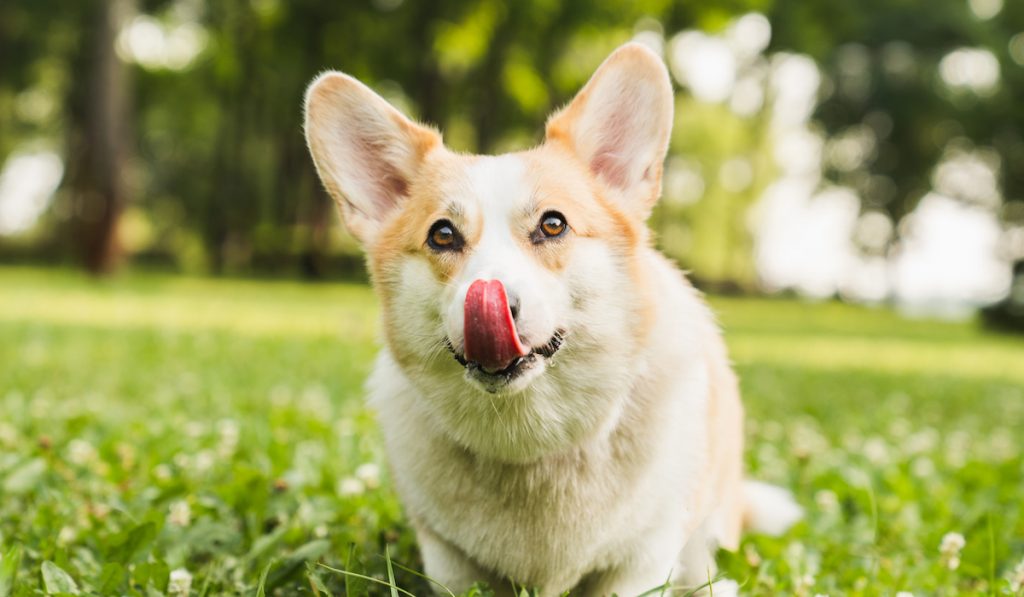Corgis are one of the most popular dog breeds. Their fluffy bum, adorable smile, and bright and fun personality are favored by many people. While they are sure to make your life a whole lot better, corgis are known to be vocal dogs.
Therefore, you might be asking, do Corgis whine a lot?
While they are known to be talkative dogs who communicate with their owners through their loud voices, it is uncommon for corgis to whine a lot. If they do, it means that they are trying to tell you something.
Below are possible reasons for your corgi to whine and the things you can do about it.

Why is My Corgi Whining?
1. Your corgi is adjusting to a new environment
It is common for dogs, especially puppies, to cry or whine when they are adjusting to a new environment.
Leaving their littermates might be a traumatic or disturbing experience for puppies, some may even pee and defecate in all parts of the house. Therefore, it is vital for owners to make the transition a positive experience.
While some dogs are able to adjust quickly, others may cry nonstop all through the night.
While there are no hard and fast rule about this, here are some of the things you can do to make the adjustment smoother:
- Play relaxing music to calm your dog
- Let them know about your presence by gently holding them
- Sleep in the same room as them
- Earn their trust by cuddling with them
- Give them enough food and water
- Provide them their own safe place, such as a dog house or a crate
Depending on the dog’s personality and age, whining will last anywhere from 3 to 14 days. Younger pups will cry longer, but they will outgrow it soon enough.
2. Your corgi is stressed

For dogs, whining is a sign of stress. Therefore, understanding your dog’s body language is vital in determining which steps to take in the future.
Aside from whining, here are other signs that your dog is stressed:
- Excessive barking or growling
- Raised hackles
- Restlessness
- Development of destructive behaviors, such as chewing, scratching, and digging
- Showing a lot of white in their eyes
One thing to look out for when a dog is stressed is when they have a very stiff body. This usually means that they are ready to attack at any time due to excessive stress.
To prevent stress for your dog, ensure that they receive the proper diet, the right amount of daily exercise, and plenty of time, love, and attention. It is important to use positive reinforcement techniques instead of harsh punishments during training.
3. Your corgi needs to sleep
There may be times when a corgi will happily play or cuddle with you, but then they will start crying after a while. You tried to give them food, water, or their toy but they still whine. One possible reason for this behavior is that they need to sleep.
It is normal for puppies to take 3 to 6 naps a day. If they don’t get enough time to rest, they will be extremely tired which can result in negative impacts on their health.
Your corgi might have trouble getting their daily nap because they do not have a safe place to sleep. Usually, a dog will choose to sleep in a corner or in an enclosed area. By providing them with their own secured area, whining may be eliminated.
4. Your corgi needs to go potty

As Corgis get used to their sleeping area, such as a crate, they may avoid soiling in it or getting it dirty.
Since they don’t want to stain their sleeping area, they may cry or whine even in the middle of the night to let you know that they want to go out to relieve themselves.
This behavior will be beneficial for you and your home since foul odor will be eliminated inside your house. Therefore, when your corgi starts whining, it may be time to take him out.
5. Your corgi is excited
When a corgi is full of energy, very happy, or too excited, it may display behaviors, such as wagging its tail, barking, jumping up and down, and it may also excitedly run in circles, also called zoomies. These behaviors may also be accompanied by whines.
One scenario is when you come home from work. Even if you haven’t opened the door yet, your corgi is thrilled to greet you by the door. Because corgis are sensitive dogs, they can easily pick up and express their emotions, and therefore will shower you with affection like they have not seen you in years.
You can redirect their excitement and energy by taking them out for a walk or a play session, such as a game of fetch, until they calm down.
6. Your corgi might be hungry
An obvious reason why a corgi is whining is because he is hungry, and therefore will cry for food. Set out a routine or a schedule for feeding and make sure that you provide your corgi with the right amount of food.
Some dogs may be picky eaters, while others will eat as long as they see food. If you’re unsure how much to feed them, it is best to consult with your veterinarian.
7. Your corgi is cold

If you live in an area with cold weather, the reason why your corgi might be whining is because they are cold.
This is especially true for puppies who have not developed their full coat yet, and therefore are sensitive to extreme weather conditions. Once they are fully grown, corgis will develop their double coats.
When a corgi is cold, whining might be accompanied by shivering or shaking, so observe your dog carefully. You may provide them with a sweater or a jacket to keep them warm. A comfortable area with a fireplace is a good idea, too.
8. Your corgi is bored and wants attention
Most dogs, including corgis, will let their owners know if they are bored and want to go out and play. Being working dogs, corgis have high levels of energy and therefore will need to be constantly stimulated physically and mentally.
They are especially the happiest when they think that what they are doing is useful.
Signs of a bored dog include short, high-pitch whines along with sighs. They may also try to dig in your yard, scratch furniture, or chew household items including your shoes. Since corgis were bred to herd, they may also try to herd small animals and younger folks.
To prevent this, make sure that you provide them with toys that will keep them busy indoors. However, don’t leave their toys available at all times. It is suggested to rotate the availability of the toys so that they won’t get tired of them easily.
Also, teaching tricks and commands will be very helpful to their mental health and it will keep them from becoming bored.
9. Your corgi is afraid

Like humans, it is essential for puppies to grow in a positive environment where they are nurtured by reputable breeders. However, this is not always the case for every dog. Some people run puppy mills that breed dogs purely for money, which results in poor and improper care of puppies.
Unfortunately, puppies that came from this kind of environment tend to grow fearful, which can result in aggression. The first signs of a fearful puppy include whining, a tucked tail, a lowered head, and trembling.
Luckily, there are things you can do to alleviate this problem and help your corgi live a happy life. Although it can be very hard and it will take you more effort to successfully do this, it is surely rewarding.
The very first thing you should focus on is building your dog’s trust. You can do this by hand feeding them until they feel safe in your presence. Once you build a strong foundation, everything else will follow and they will soon realize that the world is not as fearful as they thought it would be.
When should you be concerned?
In general, corgis are healthy dogs with a lifespan of 12 to 15 years. However, it is still possible that they suffer from health concerns.
If you find that your corgi’s whining behavior is accompanied with limping, or they constantly lick a certain part of their body, it might be because they are in pain.
Other signs for immediate action include change in appetite, weight and appearance, extreme fatigue, changes in behavior, and never-ending whines.
If this happens and your dog won’t stop crying, it is time to take him to the veterinarian right away to determine if anything more serious is wrong with him.
